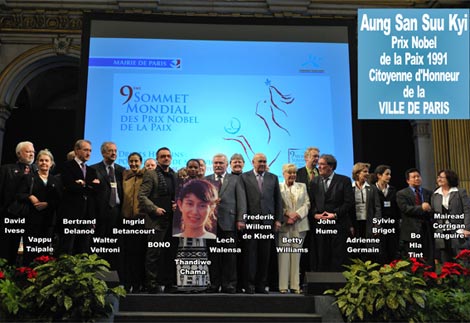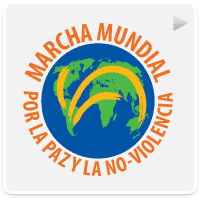The Invisibles against US missile defense
CHARTER FOR A WORLD WITHOUT VIOLENCE

www.nobelforpeace-summits.org
This document is the result of several years work of Nobel Peace Laureates and Organizations. It was approved at the 7th World Summit as the “First Draft of the Charter for a World without violence”. Throghout the last year the modifications elaborated by Nobel Peace Laureates and Organizations were amended into the the Charter and this amended text is presented for your attention. The Charter will be approved Nobel Peace Laureates and Organizations at the 8th World Summit of Nobel Peace Laureates.
Charter for a World Without Violence
No state or individual can be secure in an insecure world. The values of nonviolence in intention, thought, and practice have grown from an option to a necessity. We are convinced that adherence to the principles of nonviolence will usher in a more peaceful, civilized world order in which more effective and fair governance, respectful of human dignity and the sanctity of life itself may become a reality. Our cultures, our histories, and our individual lives are interconnected and our actions are interdependent. Especially today as never before, we believe, a truth lies before us: our destiny is a common destiny. That destiny will be defined by our intentions, decisions and actions today.
We are firmly convinced that creating a culture of peace and nonviolence, while a difficult and long process is a necessary and noble purpose. Affirmation of the principles contained in this Charter is a vital first step to ensuring the survival and development of humanity and the achievement of a world without violence. We, Nobel Peace Laureates and Laureate Organizations, Reaffirming our commitment to the Universal Declaration of Human Rights; Moved by concern for the need to end the spread of violence at all levels of society and especially the threats posed on a global scale that jeopardizes the very existence of the humankind; Reaffirming that freedom of thought and expression is at the root of democracy and creativity; Recognizing that violence manifests in many ways, such as, armed conflict, military occupation, poverty, economic exploitation, environmental destruction, corruption and prejudice based on race, religion, gender, or sexual orientation; Realizing that the glorification of violence as expressed through some forms of popular culture and mass media contributes to the acceptance of violence as a normal and acceptable condition; In the knowledge that the most harmed by violence are the weakest and vulnerable;

Remembering that peace is not only the absence of violence but that it is the presence of justice; Realizing that the failure of States to sufficiently accommodate ethnic, cultural and religious diversity is at the root of much of the violence in the world; Recognizing the urgent need to develop an alternative approach to collective security based on a system in which no country, or group of countries, needs to rely on nuclear weapons for its security; Being aware that the world is in need of the effective global mechanisms and nonviolent approaches for conflict resolution and that they are most successful when applied at the earliest possible moment; Acknowledging the natural right of oppressed people to peacefully resist oppression; Affirming that persons invested with power carry the greatest responsibility to end violence where it is occurring and to prevent violence whenever possible; Asserting that the principles of nonviolence must triumph at all levels of society as well as in relations between States and peoples; Beseech the global community to advance the following principles:
First: In an interdependent world, the prevention and cessation of armed conflict between and within States requires the collective action of the international community, which in turn requires strengthening the reforms of the UN system as well as regional cooperative organizations in order to empower them and to advance a system based upon the concept of global human security rather than that of the national security of individual states vying against each other for supremacy.
Second: To achieve a world without violence, States must abide by the rule of law and honor their legal commitments at all times.
Third: It is essential to move without further delay towards the universal and verifiable elimination of nuclear and other weapons of mass destruction. States possessing such weapons must take concrete steps towards disarmament, and a security system that does
not rely on nuclear deterrence. At the same time, States must sustain their efforts to consolidate the nuclear nonproliferation regime, inter alia by strengthening multilateral verification, protecting nuclear material and advancing disarmament.
Fourth: To eliminate violence in society, the production and sale of small arms and light weapons must be reduced and strictly controlled at international, regional, state and local levels. In addition there should be full and universal enforcement of international disarmament agreements, such as the 1997 Mine Ban Treaty, and support for new efforts aimed at the eradication of the impact of victimactivated and indiscriminate weapons, such as cluster munitions.
Fifth: Terrorism can never be justified because violence begets violence and because no acts of terror against the civilian population of any country can be carried out in the name of any cause. The struggle against terrorism cannot, however, justify violation of human rights, international humanitarian law, civilized norms, and democracy.
Sixth: Ending domestic and family violence requires unconditional respect for the equality, freedom, dignity, and rights of women, men and children by all individuals, institutions of the state, religion and civil society. Such protections must be embodied in laws and conventions at local and international levels.
Seventh: Every individual and state shares responsibility to prevent violence against children and youth, our common future and most precious gift, and to advance educational opportunities, access to primary health care, personal safety, social protection, and an
enabling environment that reinforces nonviolence as a way of life rather than a Utopian dream. Nonviolent and Peace education must be part of the curriculum worldwide.
Eighth: Preventing conflicts arising from the depletion of natural resources, in particular sources of energy and water, requires States to affirmatively and, through creation of legal mechanisms and standards, provide for the protection of the environment and to encourage people to adjust their consumption on the basis of resource availability and real human needs.
Ninth: We beseech the UN and its member states to consider ways and means of promoting the meaningful accommodation of ethnic, cultural and religious diversity in. The golden rule of a non violent world: Treat others as you wish to be treated.
Tenth: The principal political tools for bringing into being a nonviolent world are dialogue based on dignity, negotiation, and compromise, conducted on the basis of balance between the interests of the parties involved, but also taking into consideration concerns relating to the entirety of humanity and the natural environment.
Eleventh: All states must support efforts to address the inequalities in the distribution of economic resources, and resolve gross inequities which create a fertile ground for violence. The imbalance in living conditions inevitably leads to lack of opportunity, and in many cases loss of hope.
Twelfth: Civil society, including human rights defenders, peace and environmental activists must be recognized and protected as essential to building a nonviolent world as all, governments must serve the needs of their people, not the reverse. Conditions should be created to enable and encourage civil society participation in political processes at the global, regional and local levels.
Thirteenth: In implementing the principles of this Charter we call upon all to work together towards a just, killing-free world in which everyone has the right not to be killed and responsibility not to kill others. To address all forms of violence we encourage scientific research in the fields of human interaction and dialogue, and we invite participation from the academic, scientific and religious communities to aid us in the transition to nonviolent, and non-killing societies.
Following the approval of the first draft on the 19th of November 2006 during the 7th World Summit of the Nobel Peace Prize laureates, the Charter for a Non Violent World has been signed by the following Nobel laureates, as well as the representatives of those organizations that have been awarded the Nobel Peace Prize and by personalities of worldwide renown due to their efforts in favour of peace.

Signers of the Charter for a world without violence
Mairead Corrigan Maguire (Nobel Peace Laureate)
Carlos Filipe Ximenes Belo (Nobel Peace Laureate
Frederik Willem De Klerk (Nobel Peace Laureate)
Lech Walesa (Nobel Peace Laureate)
Mikhail Gorbachev (Nobel Peace Laureate)
Archbishop Desmond Mpilo Tutu (Nobel Peace Laureate)
Jody Williams (Nobel Peace Laureate)
Shirin Ebadi (Nobel Peace Laureate)
Betty Williams (Nobel Peace Laureate)
His Holiness the Dalai Lama (Nobel Peace Laureate)
Mohamed ElBaradei (Nobel Peace Laureate)
John Hume (Nobel Peace Laureate)
Adolfo Perez Esquivel (Nobel Peace Laureate)
Wangari Maathai (Nobel Peace Laureate)
American Friends Service Committee (Nobel Peace Laureate Organization)
Red Cross Italy (Nobel Peace Laureate Organization)
International Atomic Energy Agency (Nobel Peace Laureate Organization)
International Physicians for the Prevention of Nuclear War (Nobel Peace Laureate Organization)
International Peace Bureau (Nobel Peace Laureate Organization)
Supporters of the Charter for a World Without Violence
Mr. Tadatoshi Akiba
The President of the World’s Mayors for Peace
Dr. M.S. Swaminathan
Former President of the Pugwash Conferences on Science and World Affairs,
Nobel Peace Laureate Organization
Contact details:
Permanent Secretariat of Nobel Peace Lureates Summits
email: segreteria@nobelforpeace-summits.org
www.nobelforpeace-summits.org
Charter for a World Without Violence
257 kB, PDF, 28.2.2009
« back









